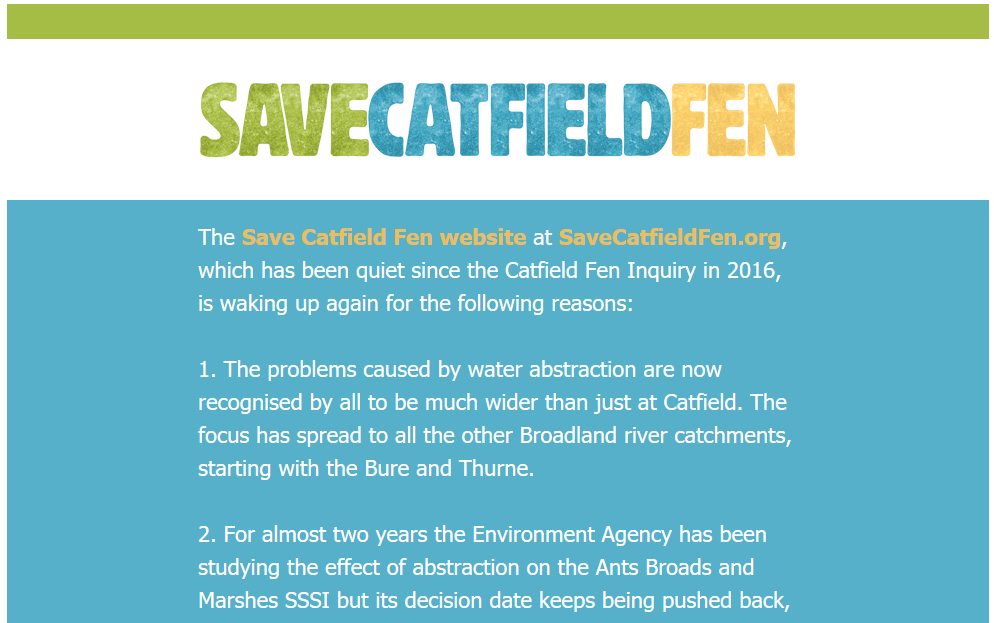
Hmmm – it seems as if the battle fought over water abstraction by the owners and managers of Catfield Fen – Mr and Mrs Tim Harris – is being seen as a useful case study with much wider relevance than even just in the Norfolk Broads, or the UK but on a more global scale (see here).
This blog played a very small part in that battle: the last blog post here on the subject was over three years ago (see here), and the penultimate one was 15 months before that (see here).
[registration_form]
Unfortunately Mark, the pattern of regulators, SNCOs and even NGOs being slow to catch up with and lend support to legitimate coal-face campaigns continues. It means that the need for individuals like Mr and Mrs Harris to pick up the baton and lead has only grown, not diminished, since their excellent success. The reasons are multi-faceted. They include severe resource stress on all these organisations and an inevitable preference to prioritise only the biggest or most winnable cases. One can have a great deal of sympathy with them on that. But much less acceptable is the pernicious influence of vested interests that has been allowed to blossom within certain of these organisations and the more widespread emergence and growing influence of appeasers that seek to quieten down dissent in the name of always choosing the ‘let’s find a middle way’ option. Sadly, the middle way is nearly always skewed towards letting damaging projects go ahead regardless, with the best that is extracted by appeasement being perhaps a little additional vague compensation effort. This parlous state of affairs is one reason why the State of Nature Reports continue to deliver a net payload of bad, not good, news. There are grounds for a return to more confrontational practice in conservation; if not trench warfare, then at least outright opposition as a more regularly employed part of the toolkit. The conservation sector, for all the success it has achieved in moving from the fringe to the mainstream in policy and practice, is simply not taken seriously without their being seen as having recourse to the nuclear option. But getting an RSPB or local Wildlife Trust interested enough in a local campaign to make a fierce stand is more difficult than ever. You yourself have had to take the lead on matters that one might reasonably have expected to fall to such actors (matters one also suspects they would have bitten on much more readily in the past). The other thing that needs to be re-calibrated is the assumption that the statutory ‘agencies’ can still carry the mantle of being statutory ‘authorities’. An assumption that remains damagingly prevalent amongst decision makers who will, for example, take NE’s or the EAs word over that of a Wildlife Trust or the RSPB (or indeed a local expert unaffiliated to any organisation) at face value, even if the science and evidence points clearly elsewhere. For me, one of the great and unforgivable failings of NE, and indeed the other country agencies, is that they refuse to be self deprecating in the face of their existential crises: they refuse to stand up and say that swingeing diminution of their resources can only go hand in hand with parallel diminution in their reliability as an authority. Instead they try to stoke the myth that they are pretty much as effective, and as much of an authority, as they ever were. It’s nonsense. Of course this desperate finger-nail grip on self-importance is maintained as a means to secure self-preservation. The extinct to survive is understandable, but when it results in wildlife and truly sustainable decision making being the losers, facilitating biodiversity decline, then it is unforgiveable. In the case of NE, Tony Juniper has at least bemoaned the lack of NE funding since coming into post, but he has only so far flirted with saying loudly and clearly that it makes NE close to ineffective in many of their statutory functions. He can’t expect to cure the former problem without mentioning the latter.
A lot of this is true, but I would just point out that the RSPB have been heavily involved in this case and provided pivotal evidence before and during the 2016 Public Inquiry, where they provided an expert witness and sent a legal team. They remain involved in the case, though it is also absolutely true that the Harrises have led and continue to lead and are without doubt the conservation heroes of this ongoing battle.
Palustre – that is true, although the RSPB were at first reluctant to be involved in this issue – I remember making a phone call that helped them become more involved.